- Topics
- Campaigning
- Careers
- Colleges
- Community
- Education and training
- Environment
- Equality
- Federation
- General secretary message
- Government
- Health and safety
- History
- Industrial
- International
- Law
- Members at work
- Nautilus news
- Nautilus partnerships
- Netherlands
- Open days
- Opinion
- Organising
- Podcasts from Nautilus
- Sponsored content
- Switzerland
- Technology
- Ukraine
- United Kingdom
- Welfare
Working for you, past and present – the Union's proud record of supporting members during global emergencies
21 April 2020
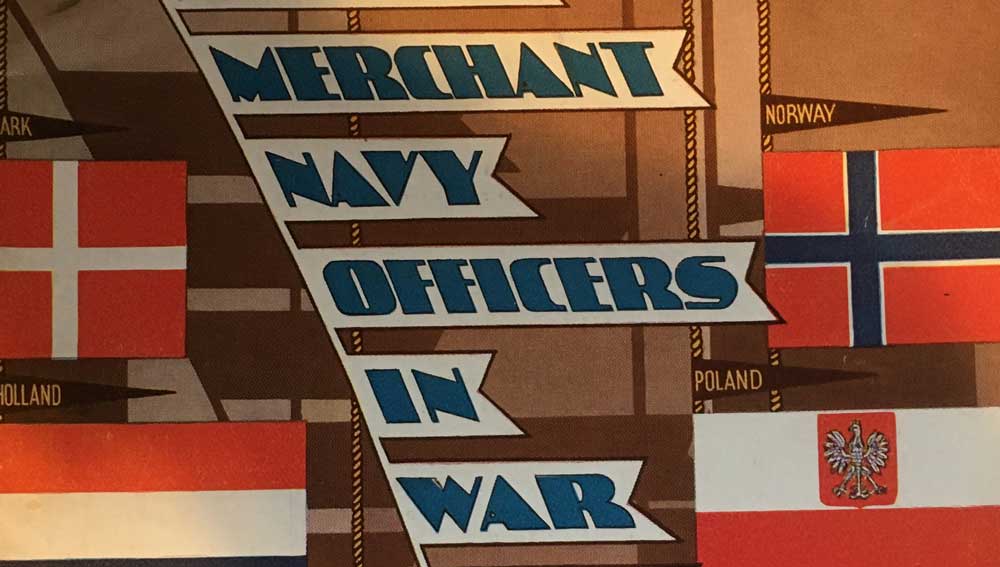
During the Covid-19 coronavirus pandemic, Nautilus has fought hard to maintain employment rights for members and secure special travel permissions for seafarers who play an essential part in the global supply chain. And it's not the first time the Union has had to speak up like this in a time of international crisis. Andrew Linington looks back at the First and Second World Wars to see how today's Nautilus members and staff can take heart from the way their predecessors overcame similar challenges
'Day after day, it is constantly borne in upon the general public that the safety, nay the existence, of the Nation depends on ships, ships and more ships.'
These words, written 104 years ago by the Marine Engineers' Association (MEA) – one of the unions that went on eventually to become Nautilus – could have been written today. But, sadly, they also highlight how it seems to take a national crisis for the UK to wake up to its reliance upon ships and seafarers and how easily the lessons of history are lost.
Nautilus and its predecessor unions have provided vital support for members during these times of crisis, as well as serving as a much-needed voice for seafarers when emergency situations brought governments, employers and employees together to tackle the pressing problems of the day – much like the response to the coronavirus pandemic witnessed today.
First World War – 1914-1918
The First World War and the arrival of submarine warfare put civilian seafarers right into the front line of conflict. Some 15m tons of world shipping was lost – 9m tons from the UK fleet alone – and almost 15,000 British seafarers died as a result of enemy action between 1914 and 1918.
From the outbreak, the MEA, the Mercantile Marine Service Association and the Imperial Merchant Service Guild, which represented shipmasters and navigating officers, were quick to assist their members. As well as negotiating 'war risk' pay and agreements, one of the first priorities was to stop the appalling practice through which seafarers went off pay as soon as their ships were sunk.
Although the British Admiralty agreed in 1915 to pay wages to the surviving crew of a ship under charter to the government until they reached their homes, many commercial companies showed no such compassion until forced to in 1917.
The MEA reported that some of its members had survived not one loss, but as many as four, yet the unions had to spend much time fighting for compensation for their members who had lost personal belongings when their ships went down, as such payments were not automatic.
As part of their negotiations over 'warlike operations' service, the unions managed to get increased pay rates and pensions for seafarers serving on ships taken up from trade, and were also successful in securing government agreement to reduce the rates of income tax for merchant seafarers and to provide assistance for the costs of travelling to and from their vessels.
They also provided support for members who had been interned in prisoner of war camps, sending parcels of food and clothing, and maintaining lines of communications. They worked with welfare agencies to supply clothing and footwear for seafarers coming ashore after attacks on their vessels, and established benevolent funds 'to relieve distress amongst members or their dependants caused by the war'.
A letter to the MEA journal in 1917 proved sadly prophetic. 'Newspapers wax eloquent nowadays on the value of the Mercantile Marine, but it required a serious crisis in the country's affairs to bring this to the notice of either press or public – clear proof that we have always been content to "carry on" and make no fuss,' a member wrote. 'A week after the war, we shall be forgotten again unless we make ourselves heard.'
Lasting effects of WW1
The unions did emerge from the conflict with some major and lasting advances.
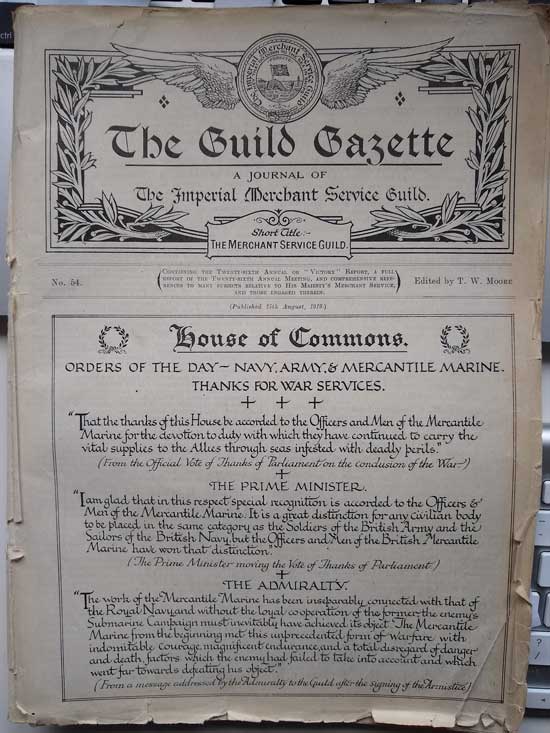
They helped to get seafarers included for the first time in the national unemployment insurance scheme, while a long-running struggle to achieve a national pay scale for seafarers moved to a higher level in spring 1914, when the MEA instructed members not to take jobs unless they were at a higher wartime rate.
This tactic proved very successful when some vessels were held up through a lack of engineer officers.
The sacrifices made by seafarers were recognised by King George V's decision to confer the title of Merchant Navy on the commercial fleet, and by the agreement in 1918 to introduce a standard merchant service uniform – something the unions had been seeking for some time.
Second World War –1939-1945
In the years leading up to the start of the Second World War, the Navigators' & Engineer Officers' Union (NEOU) had been repeatedly telling the government not to overlook the strategic importance of shipping and seafaring. In response to its concerns about a shortage of maritime professionals, a Merchant Navy Reserve was set up in 1938 to create a register of experienced seafarers willing to return to sea at a time of national crisis.
The union had also campaigned strongly during 1938 against proposals to lay-up British ships in response to a slump in trade, warning ministers that 'the Merchant Navy is still our first and last line of defence', and its long-standing calls to establish a Ministry of Shipping were hastily acted upon soon after the war broke out.
In 1940, as the impact of war started to hit shipping hard, the owners and the unions jointly developed proposals for an essential work order in an attempt to reduce the risk of ships being delayed by crew shortages. Introduced in May 1941, this had the effect of creating continuous, rather than casual, employment through a pool of reserve seafarers managed by unions, owners and the Ministry of War Transport.
This centralisation of supply was highly successful, with the pool supplying an average of 400 officers and 3,250 ratings every week. The essential work order also resulted in the creation of a new Central Register of Seamen and the introduction, in 1942, of a special seafarers' identity card.
The unions also secured an agreement with the shipowners and the Board of Trade for shipwrecked seafarers were to get full wages – including £5 per month war risk payments – until their return to the UK or until being offered another job. The NEOU welcomed 'the speedy introduction of a scheme of disablement and widows' pensions', as well as an agreement to provide reduced rail fares for MN seafarers and their wives.
The Second World War also saw the Officers' (MN) Federation providing practical support and facilities to 18 foreign officers' unions, including those from the Netherlands, Norway, Denmark, Belgium and France. It successfully argued against proposals to reduce the higher pay of foreign officers to British levels and that any lower rates should be brought up to British standards.
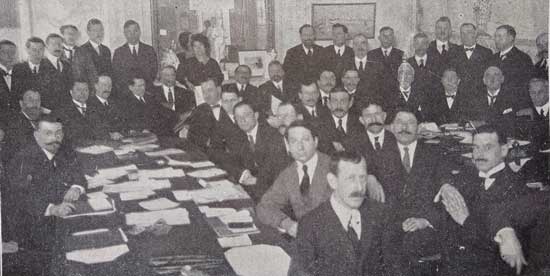
The Federation sought special provision to be made for the care of merchant seafarers whose physical or mental wellbeing had been damaged as a result of their service. It lobbied the Ministry of War Transport on behalf of members who had been held in prisoner of war (PoW) camps – notably protesting about the policy that resulted in war risk payments being stopped from the moment they were taken prisoner. At the end of the war, the Federation was actively involved in the arrangements for the repatriation and reception of seafarers from PoW camps – ensuring that they could return home as soon as possible, with the speedy issue of identity cards, clothing coupons, ration cards and allowances for loss of personal effects.
The NEOU had also called for special pension arrangements to be made for senior officers who had served in both world wars, allowing them to retire on an adequate pension from the age of 55.
It had taken some time for the public to recognise the huge scale of sacrifice amongst merchant seafarers, with some union members complaining of being socially shunned for not being in the armed forces and others describing how they were treated like 'lepers' or 'criminals' after arriving home when their ships had been sunk.
Through its connections with the Watch Ashore, the organisation for officers' wives, the NEOU had helped to alleviate such ignorance by supporting the collection and distribution of 'comforts' – emergency kits of clothing and other supplies – for ships' crews, as well as visiting MN casualties in hospital.
Lasting effects of WW2
While seafarers suffered many appalling deprivations during the war, the unions managed to secure some crucial advances in their terms and conditions. These included measures to better control working hours for some crew, progress on the organisation of catering departments and improved compensation for loss of effects, while the statutory victualling scale – which dated back to 1906 – was radically amended in 1940, introducing new requirements for fresh food.
The NEOU was part of a special committee established by the government in November 1943 to investigate welfare provision for seafarers. The committee's report noted that maritime welfare services had traditionally been almost entirely undertaken by charities, and from the committee's recommendations, the Merchant Navy Welfare Board and its related system of port or regional welfare committees was established in 1948.
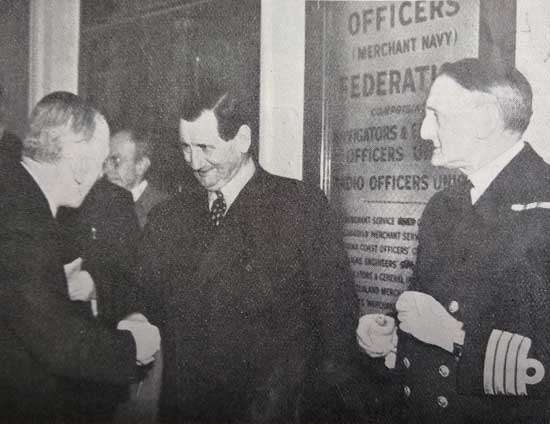
February 1942 had seen the launch of the Merchant Navy Training Board – with unions, shipowners and government representatives sitting down to draw up post-war training schemes for MN personnel – and later in the year, the Ministry of War Transport invited the Officers' Federation to submit proposals for a post-war shipping policy.
The Council replied that the scope of matters to be considered – including improved pay and conditions for masters and officers – meant that detailed plans would take some time to produce. However, it stressed, high priority should be placed upon the UK ratification of ILO Conventions.
The NEOU repeatedly expressed hopes that the post-war period would witness a 'fundamental and spectacular revision of the whole position of seafarers in the scheme of the world's life'. Arguing that the public would be prepared to pay an extra farthing for a loaf of bread if they knew it would ensure decent pay and conditions for seafarers, it pointed out that few would notice 'the difference in cost between giving seafarers an impoverished mode of life, wretched conditions, little or no welfare amenities in ports, or, on the other hand, rewarding them with generous pay, excellent accommodation and conditions aboard ship, pensions, modern welfare amenities'.
In 1941, at the height of the Battle of the Atlantic, the writer and broadcaster J.B. Priestley made a passionate appeal on behalf of merchant seafarers. 'We owe them something more than sentimental speeches made at a time when our lives depend on their skill and courage. We owe these men a square deal,' he pointed out.
'In the last war we praised them to the skies, gave them a pat on the back, and stood them drinks. What we didn't stand them were better conditions and a reasonably secure future. If we're proud of the Merchant Service now, let's see to it that we remain proud of it – and that it's something to be proud of – in the years to come.'
However, NEOU president Lord Winster told a parliamentary debate in October 1944 that he had little confidence in the rosy future that had been pledged to merchant seafarers. 'They have heard similar promises and fair words before, and they have tramped the streets in misery after hearing them,' he pointed out.
Lessons learned?
It wasn't long before Lord Winston's prediction came true. Barely a fortnight after the defeat of Germany, British owners tabled proposals to reduce the gross earnings of shipmasters and officers. The NEOU managed to stave off the pay cuts, but Lord Winster's pessimism was to prove largely correct over subsequent years. Even the hopes that the Merchant Navy's critical role in the 1982 Falklands task force would persuade the UK government to reverse its 'hands-off' approach to shipping policy were to prove unfounded as British seafarers joined the dole queues only months after returning from the South Atlantic.
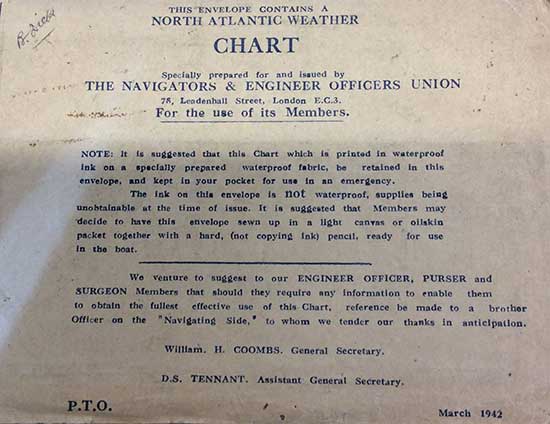
Coronavirus has once again delivered a much-needed wake-up call to society about the importance and fragility of its supply chains – especially in a globalised just-in-time delivery infrastructure.
This time, will it be too much to ask for a lasting recognition of the essential role of shipping and seafarers? Proud of its past, Nautilus will be doing all it can to make that a reality in the years ahead.
Tags
